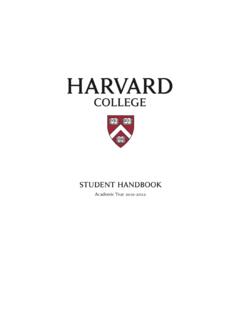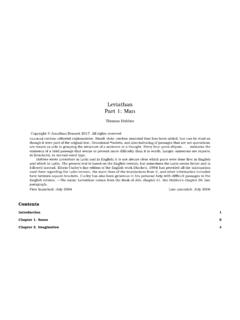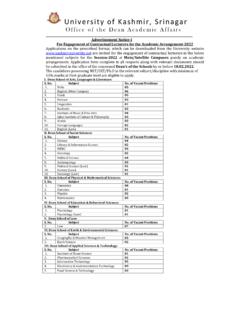Transcription of FIELDS OF CONCENTRATION
1 FIELDS OF CONCENTRATIONA cademic Year 20201-2022 1 Table of Contents CONCENTRATIONS 4 African and African American Studies 5 Anthropology 13 Applied Mathematics 23 Art, Film, and Visual Studies 27 Astrophysics 32 Biomedical Engineering 35 Chemical and Physical Biology 38 Chemistry 41 Chemistry and physics 44 Classics 48 Comparative Literature 53 Computer Science 56 Earth and Planetary Sciences 62 East Asian Studies 67 Economics 72 Electrical Engineering 77 Engineering Sciences 81 English 90 Environmental Science and Engineering 96 Environmental Science and Public Policy 99 Folklore and Mythology 103 Germanic Languages and Literatures 106 Government 110 history 115
2 history & Literature 119 history and Science 122 history of Art and Architecture 132 Human Developmental and Regenerative Biology 139 Human Evolutionary Biology 142 Integrative Biology 146 Linguistics 148 Mathematics 156 Mechanical Engineering 162 Molecular and Cellular Biology 167 Music 171 Near Eastern Languages and Civilizations 175 Neuroscience 180 2 philosophy 185 physics 190 Psychology 197 Comparative Study of Religion 207 Romance Languages and Literatures 212 Slavic Languages and Literatures 218 Social Studies 222 Sociology 225 South Asian Studies 228 Special Concentrations 232 Statistics 235 Theater, Dance, & Media 241 Women, Gender, and Sexuality, Study of 244 SECONDARY FIELDS 248 African and African American Studies 249 Anthropology 251 Archaeology 253 Art, Film.
3 And Visual Studies 255 Astrophysics 258 Celtic Languages and Literatures 260 Chemistry 262 Classics 264 Comparative Literature 265 Computer Science 266 Earth and Planetary Sciences 267 East Asian Studies 269 Economics 271 Educational Studies 273 Energy and Environment 275 English 277 Environmental Science and Public Policy 278 Ethnicity, Migration, Rights 280 European history , Politics, and Societies 282 Folklore and Mythology 284 Germanic and Scandinavian Studies 286 Global Health and Health Policy 288 Government 290 history 292 history of Art and Architecture 294 history of Science 296 3 Human Evolutionary Biology 297 Integrative Biology 298 Linguistics 299 Mathematical Sciences 302 Medieval Studies 303 Microbial Sciences 305 Mind Brain Behavior 307 Molecular and Cellular Biology 309 Music 311 Near Eastern Languages and Civilizations 312 Neuroscience 316 philosophy 318 physics
4 322 Psychology 324 Comparative Study of Religion 327 Romance Languages and Literatures 328 Russia, Eastern Europe, and Central Asia 331 Slavic Languages and Literatures 332 Sociology 334 South Asian Studies 336 Statistics 337 Theater, Dance & Media 338 Translation Studies 339 Studies of Women, Gender, and Sexuality 341 LANGUAGE CITATIONS 342 4 CONCENTRATIONS 5 African and African American Studies Professor Glenda Carpio, Director of Undergraduate Studies The Department of African and African American Studies brings together scholars and scholarship from many disciplines to explore the histories, societies, and cultures of African and African-descended people.
5 The field of African and African American studies is not only interdisciplinary but also comparative and cross-cultural. Africans and people of African descent have developed cultural forms that have profoundly shaped the fine arts and popular culture in the Americas and all around the planet. Comparative and cross-cultural studies of Africa and its diaspora contribute enormously to our understanding of race and ethnicity, and ideas about race are among the central objects of study in the field of African and African American Studies.
6 In addressing the ethical, social, and political consequences of racial thinking, the African and African American Studies faculty raise questions relevant to the experiences of all peoples. The Department offers two distinct courses of study: the African track and the African American track. African track concentrators come to the program with a variety of interests ( , the environment, public health, music, ethnic relations, religion, politics, economic development, and literature). Components of the African track include study in the African Languages Program, required courses, electives, and the option of study abroad.
7 The Department offers seminars and lecture courses on a variety of Africa-related topics. Concentrators in the African track are encouraged to take courses in a variety of departments, including history of Art and Architecture, Music, Economics, Government, history , Anthropology, Social Studies, Romance Languages and Literatures, and the Comparative Study of Religion. Courses in the Divinity School, the Graduate School of Education, and Kennedy School of Government may also be available for CONCENTRATION credit.
8 The African American track attracts students with an equally wide range of interests. There are many reasons students pursue African American Studies. First, African American music, literature, and visual arts are significant cultural achievements worthy of study in their own right. Second, African Americans have played a crucial role in the history of the United States, participating in the American Revolution, the Civil War, Reconstruction, women s suffrage, and the New Deal; and they led the struggle for equality in the second half of the twentieth century.
9 Third, because American political life remains encumbered by racism and its historical legacy, a proper historical, sociological, and economic understanding of race relations continues to be essential for those who seek to make or evaluate public policy. Fourth, some of the social relations that have developed in countries such as the United States, Cuba, Jamaica, Haiti, and Brazil provide important examples of ethno-racial conflict, and through the study of them, it is possible to gain insight into what remains a problem across the globe.
10 Exploring African and African American cultures requires us to explore aspects of the many other cultures and peoples that have created the mosaic of the modern world. Thus, diaspora studies are integral to each track. In many parts of the Caribbean and Latin America, for example, religions and performance arts are influenced by traditional African belief systems and practices. The cultures of the African Atlantic diaspora have also developed in interactions with other peoples: the many Native American cultures; the Dutch, English, French, German, Irish, Italian, Polish, Portuguese, Russian, Scandinavian, Scottish, Spanish, and other European groups that came with colonists and immigrants; and the traditions that have come with immigrants from East and South Asia.









